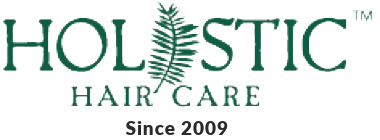{{ Interface.PageTitle }}
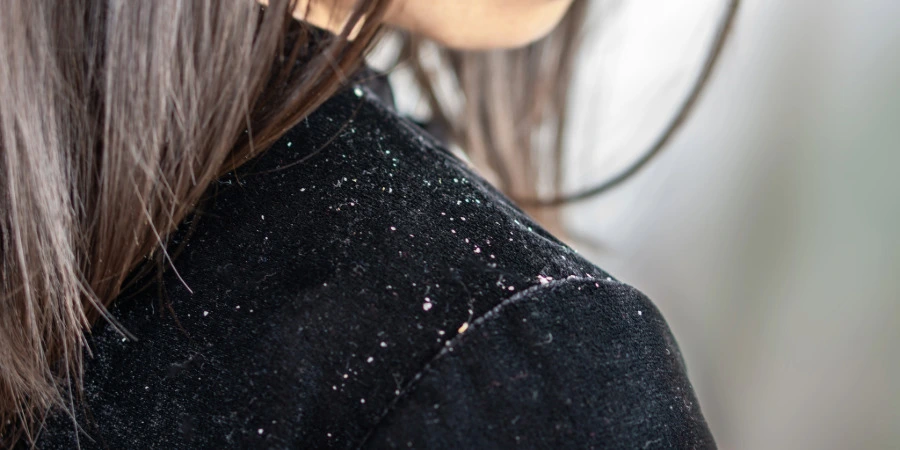
Dandruff affects nearly 50% of adults worldwide, causing embarrassing white flakes, persistent itchiness, and scalp irritation that can significantly impact your confidence and daily comfort. This common scalp condition doesn't just create visible flakes on your shoulders - it can lead to social anxiety, affect your styling choices, and make you constantly worry about your appearance.
Understanding what causes dandruff and learning effective treatment methods can help you achieve a healthy, flake-free scalp permanently. This comprehensive guide will explore everything from the root causes of dandruff to professional scalp treatments that can restore your scalp's health and your confidence.
What is Dandruff?
Dandruff is a common scalp condition characterized by the excessive shedding of dead skin cells from the scalp, resulting in visible white or yellowish flakes that appear in your hair and on your clothing. Unlike normal skin cell turnover, which happens gradually and invisibly, dandruff creates noticeable flakes due to accelerated cell renewal and inadequate removal of dead skin.
The medical term for dandruff is seborrheic dermatitis when it becomes more severe, but everyday dandruff is primarily caused by an overgrowth of a naturally occurring fungus called Malassezia. This yeast-like fungus feeds on the oils produced by your hair follicles, creating irritation that speeds up skin cell production.
What makes dandruff different from dry scalp is the presence of oily, larger flakes rather than small, dry particles. Dandruff flakes tend to be yellowish or white with a slightly greasy texture, while dry scalp produces smaller, purely white flakes. Understanding this distinction is crucial for choosing the right treatment approach.
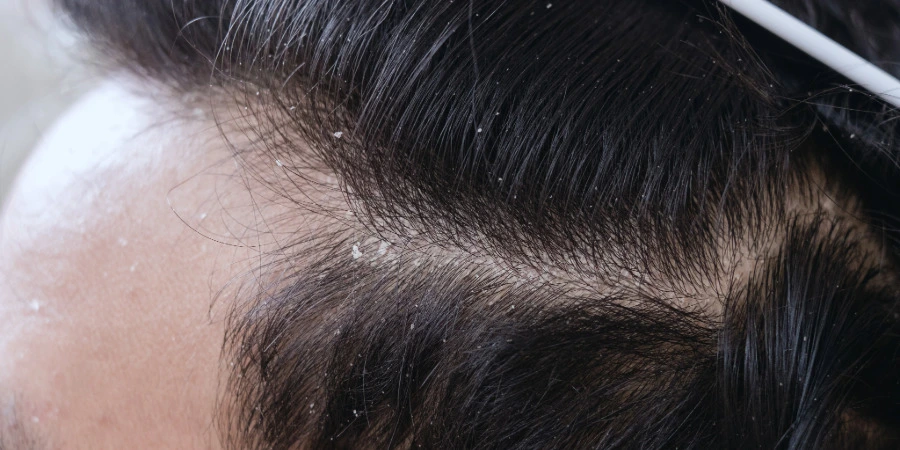
Signs and Symptoms
- Early Warning Signs:
The first signs of dandruff often appear as mild scalp itchiness, particularly after washing your hair or during stressful periods. You might notice occasional small flakes on dark clothing or feel the urge to scratch your scalp more frequently than usual. - Progressive Symptoms:
As dandruff develops, you'll observe larger, more visible flakes accumulating in your hair and falling onto your shoulders. The itchiness becomes more persistent and may worsen in certain areas like the crown, hairline, or behind the ears. Your scalp might feel tight or irritated, especially after hair washing. - Advanced Symptoms:
In severe cases, dandruff can cause red, inflamed patches on the scalp, persistent itching that leads to scratching and potential secondary infections, and thick, crusty scales that are difficult to remove. The condition may extend beyond the scalp to affect eyebrows, beard area, and the sides of the nose. - When to Be Concerned:
Seek professional help if you experience bleeding from excessive scratching, hair loss in affected areas, spreading of symptoms to other parts of your face or body, or if over-the-counter treatments fail to provide relief after 4-6 weeks of consistent use. - Self-Assessment Indicators:
Check for visible flakes on your clothing after brushing your hair, persistent scalp itchiness that interferes with daily activities, oily or greasy-feeling scalp despite regular washing, and flakes that return quickly after shampooing.
Root Causes and Risk Factors
- Primary Causes:
- Malassezia Fungus Overgrowth:
The most common cause of dandruff is the excessive growth of Malassezia, a yeast-like fungus that naturally lives on everyone's scalp. When this fungus multiplies beyond normal levels, it feeds on scalp oils and produces irritating byproducts that trigger inflammation and accelerated skin cell turnover. - Greasy and Oily Scalp:
Overactive sebaceous glands produce excess oil, creating an ideal environment for Malassezia growth. This excess oil also causes dead skin cells to clump together, forming the characteristic large, oily flakes associated with dandruff. - Poor Hygiene Practices:
Infrequent washing allows oil, dead skin cells, and fungus to accumulate on the scalp. However, over-washing can also trigger dandruff by stripping natural oils and causing reactive oil overproduction.
- Malassezia Fungus Overgrowth:
- Secondary Contributing Factors:
Stress significantly impacts scalp health by affecting hormone levels and immune function, making you more susceptible to dandruff flare-ups. Cold, dry weather can worsen symptoms, while humid conditions may promote fungal growth.
Harsh hair care products containing sulfates, alcohol, or strong fragrances can irritate the scalp and disrupt its natural balance. Chemical treatments like hair dyes, perms, or relaxers can also trigger or worsen dandruff in sensitive individuals. - Lifestyle Factors:
Diet plays a role in scalp health - diets high in sugar and processed foods may promote fungal growth, while deficiencies in zinc, B vitamins, or healthy fats can compromise scalp barrier function. Lack of sleep and high stress levels weaken immune function, making it harder for your body to control fungal overgrowth naturally. - Age and Gender Considerations:
Dandruff most commonly appears during adolescence when hormone fluctuations increase oil production. Men are more likely to develop dandruff due to higher androgen levels, which stimulate sebaceous gland activity. The condition often improves with age as oil production naturally decreases.
Types of Dandruff
- Dry Skin Dandruff:
Characterized by small, white, dry flakes that fall easily from the scalp. This type is more common in cold, dry weather and typically responds well to gentle moisturizing treatments. The scalp may feeltight and itchy, but without the oily sensation of other dandruff types. - Oily Skin Dandruff (Seborrheic Dermatitis):
Features larger, yellowish, greasy flakes that stick to the hair and scalp. This type is associated with overactive oil glands and Malassezia overgrowth. The scalp appears red and inflamed, and flakes have an oily texture that's harder to brush away. - Fungal Dandruff:
Primarily caused by Malassezia overgrowth, this type creates persistent, recurring flakes with intense itching. The scalp may have a musty odor, and symptoms often worsen in humid conditions or when using oil-based hair products. - Product-Related Dandruff:
Results from sensitivity or allergic reactions to hair care products. This type often appears suddenly after using new products and may be accompanied by redness, burning, or contact dermatitis symptoms. - Severity Classifications:
- Mild Dandruff: Occasional small flakes with minimal itching that responds quickly to anti-dandruff treatments.
- Moderate Dandruff: Regular flaking with noticeable itching that requires consistent treatment and may take several weeks to control.
- Severe Dandruff: Persistent, large flakes with intense itching, scalp inflammation, and possible secondary infections requiring professional treatment.
Diagnosis and Professional Assessment
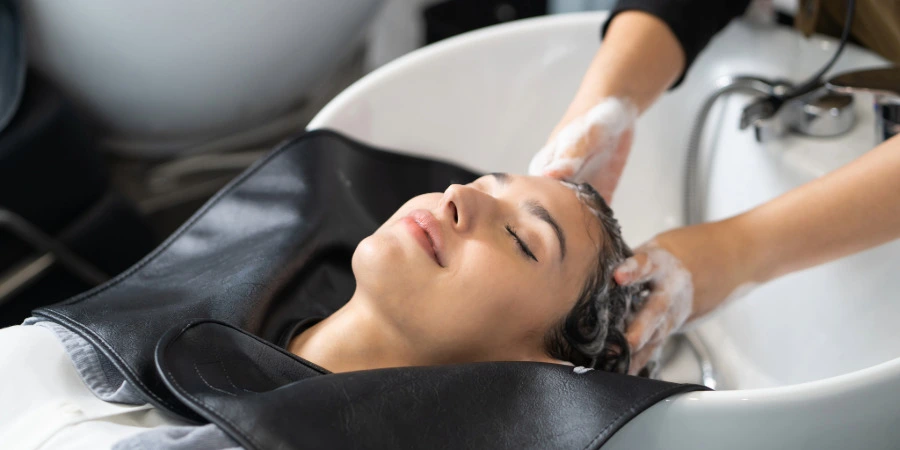
- When to Consult a Hair Care Specialist:
Schedule a consultation at Holistic Hair Care if your dandruff persists despite using anti-dandruff products for 4-6 weeks, if you experience severe itching that interferes with sleep or daily activities, or if you notice hair loss, bleeding from scratching, or spreading of symptoms beyond the scalp. - Assessment Methods:
Our Hair Care Specialists at Holistic Hair Care locations in Kepong, Cheras, and Puchong use advanced scalp analysis techniques to examine your scalp condition thoroughly. This includes digital scalp imaging to identify the type and severity of dandruff, assessment of oil production levels, and evaluation of any underlying scalp conditions. - What to Expect During Your Consultation:
Your Hair Care Specialist will begin with a detailed discussion of your symptoms, hair care routine, lifestyle factors, and previous treatments attempted. They'll perform a comprehensive scalp examination using specialized equipment to magnify and analyze your scalp condition.
The assessment includes checking for signs of inflammation, evaluating the type and distribution of flakes, testing scalp pH levels, and identifying any contributing factors like product sensitivities or poor hair care practices. - Questions to Ask Your Specialist:
- What type of dandruff do I have, and what's causing it?
- Which treatments would be most effective for my specific condition?
- How long should I expect treatment to take?
- What changes should I make to my hair care routine?
- How can I prevent dandruff from recurring?
- Are there any lifestyle factors contributing to my condition?
Prevention Strategies
- Lifestyle Modifications:
Maintain a balanced diet rich in zinc, B vitamins, and omega-3 fatty acids to support scalp health. Manage stress through regular exercise, adequate sleep, and relaxation techniques, as stress can trigger dandruff flare-ups.
Stay hydrated and limit sugar intake, which can promote fungal growth. Consider taking probiotics to support overall immune function and maintain a healthy balance of microorganisms on your skin. - Hair Care Routine Adjustments:
Wash your hair regularly (2-3 times per week for most people) using lukewarm water, as hot water can strip natural oils and trigger reactive oil production. Choose gentle, sulfatefree shampoos that won't over-dry your scalp.
Brush your hair daily with a clean brush to distribute natural oils and remove dead skin cells before they accumulate. Avoid aggressive scrubbing when washing - instead, massage gently with fingertips to stimulate circulation without causing irritation. - Products to Avoid:
Eliminate hair products containing harsh sulfates, alcohol, or strong fragrances that can irritate sensitive scalps. Avoid over-styling with heat tools, which can dry out the scalp and disrupt its natural balance.
Limit use of heavy styling products like gels, pomades, or hairsprays that can clog pores and create buildup on the scalp. Choose products labeled as "scalp-friendly" or "for sensitive skin." - Protective Measures:
Protect your scalp from extreme weather by wearing hats in cold, dry conditions and avoiding prolonged sun exposure. Use a humidifier during dry seasons to maintain optimal moisture levels.
Clean your hairbrushes and styling tools regularly to prevent bacteria and fungus buildup. Change pillowcases frequently and choose breathable, natural fabrics that won't trap moisture and heat against your scalp.
Treatment Options Overview
Professional Scalp Treatments: Check out our professional treatments →
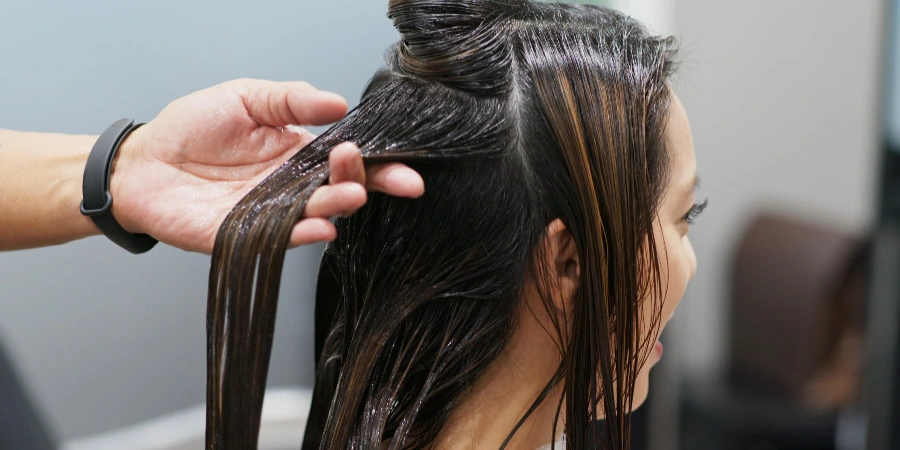
Living with Dandruff
- Daily Management Tips:
Start each day by gently brushing your hair to remove any overnight flake accumulation. Choose clothing colors that won't show flakes prominently - lighter colors for those with darker hair and darker colors for those with lighter hair.
Keep a small brush or comb handy for quick touch-ups throughout the day. If itching occurs, resist scratching and instead gently massage the scalp or apply a small amount of anti-itch serum if available. - Styling Suggestions:
Opt for hairstyles that don't require heavy products or tight pulling, which can worsen scalp irritation. Loose, natural styles work best during active dandruff episodes. Consider shorter haircuts that are easier to keep clean and require less product.
Use dry shampoo sparingly and choose formulas specifically designed for sensitive scalps. When using styling products, apply them primarily to hair lengths rather than the scalp area. - Confidence-Building Strategies:
Remember that dandruff is an extremely common condition that affects nearly half of all adults - you're not alone in dealing with this challenge. Focus on the progress you're making with treatment rather than occasional setbacks.
Invest in quality clothing in colors that work with your hair color to minimize visible flakes. Consider scarves or accessories that can provide additional coverage when needed while you're working on treatment. - Support and Resources:
Connect with others who understand the challenges of managing dandruff through online communities or support groups. Stay informed about new treatment options and research developments in scalp health.
The Hair Care Specialists at Holistic Hair Care provide ongoing support and guidance throughout your treatment journey, helping you maintain motivation and adjust your care routine as needed.
When to Seek Professional Help
- Red Flags and Warning Signs: Seek immediate professional help if you experience severe scalp inflammation with pus or bleeding, sudden hair loss in patches, spreading of the condition to other areas of your face or body, or signs of secondary bacterial infection such as increased redness, warmth, or fever.
Contact a Hair Care Specialist if your dandruff suddenly worsens dramatically, if you develop thick, crusty scales that are difficult to remove, or if you experience severe itching that prevents sleep or normal daily activities. - Choosing the Right Specialist: Look for Hair Care Specialists with specific training in scalp conditions and experience treating various types of dandruff. At Holistic Hair Care, our specialists combine advanced technical knowledge with a holistic approach to scalp health.
Consider factors like location convenience (we have locations in Kepong, Cheras, and Puchong), treatment philosophy, available services, and the specialist's ability to create personalized treatment plans based on your specific needs and lifestyle. - Treatment Expectations and Timelines: Most people see initial improvement within 2-4 weeks of starting professional treatment, with significant results typically achieved within 6-8 weeks. However, complete resolution may take 3-6 months depending on the severity of your condition and consistency with treatment.
Maintain realistic expectations - dandruff management is often an ongoing process rather than a one-time cure. Your Hair Care Specialist will work with you to develop sustainable long-term maintenance strategies to prevent recurrence.
Frequently Asked Questions

- Q: How long does it take to get rid of dandruff permanently?
A: While you can achieve long-term control of dandruff, "permanent" elimination isn't always realistic since the underlying factors (like Malassezia fungus) are naturally present on everyone's scalp. Most people see significant improvement within 4-8 weeks of proper treatment, but maintaining results requires ongoing scalp care. With the right treatment plan from our Hair Care Specialists, you can achieve months or years of flake-free scalp health. - Q: Can dandruff cause hair loss?
A: Dandruff itself doesn't directly cause permanent hair loss, but excessive scratching can damage hair follicles and lead to temporary hair thinning. Severe, untreated dandruff can also create an unhealthy scalp environment that may contribute to hair weakness. Proper treatment helps maintain both scalp health and hair growth. - Q: Is dandruff contagious?
A: No, dandruff is not contagious. While the Malassezia fungus that contributes to dandruff is present on everyone's scalp naturally, the condition develops due to individual factors like genetics, oil production, and immune response rather than person-to-person transmission. - Q: What's the difference between dandruff and scalp psoriasis?
A: Dandruff typically produces smaller, oily flakes and affects only the scalp, while scalp psoriasis creates thicker, silvery scales and often extends beyond the hairline to other body areas. Psoriasis patches are usually more defined and may be accompanied by bleeding when scales are removed. A professional assessment can help distinguish between these conditions. - Q: Why does my dandruff get worse in winter?
A: Cold, dry air reduces scalp moisture, leading to increased irritation and flaking. Indoor heating further dries the air, while wearing hats can trap moisture and create conditions for fungal growth. Additionally, people often wash their hair less frequently in winter, allowing buildup to accumulate. - Q: Can stress really cause dandruff?
A: Yes, stress can trigger or worsen dandruff by affecting hormone levels, immune function, and oil production. Stress also tends to disrupt healthy routines like regular hair washing and proper nutrition, creating additional factors that contribute to dandruff development. - Q: How often should I wash my hair if I have dandruff?
A: Most people with dandruff benefit from washing their hair 2-3 times per week with appropriate products. Washing too frequently can over-strip natural oils and trigger reactive oil production, while washing too infrequently allows buildup accumulation. Your Hair Care Specialist can recommend the optimal frequency for your specific scalp type. - Q: Are natural remedies effective for treating dandruff?
A: Some natural ingredients like tea tree oil, apple cider vinegar, and coconut oil have anti-fungal properties that can help manage mild dandruff. However, severe or persistent dandruff typically requires professional treatment for effective control. Natural remedies work best as complementary approaches alongside proper scalp care treatments.
Conclusion
Dandruff doesn't have to control your life or limit your confidence. Understanding that this common condition stems from treatable causes like Malassezia fungus overgrowth, greasy scalp conditions, and poor hygiene practices empowers you to take effective action. With the right combination of professional scalp treatment, consistent at-home care, and lifestyle adjustments, you can achieve the healthy, flake-free scalp you deserve.
The key to successful dandruff management lies in identifying your specific type of dandruff and addressing its root causes rather than just treating surface symptoms. Whether you're dealing with oily, dry, or fungal dandruff, professional assessment and personalized treatment make all the difference in achieving lasting results.
Don't let dandruff hold you back any longer. Take the first step toward scalp health by scheduling a consultation with our experienced Hair Care Specialists at Holistic Hair Care. With convenient locations in Kepong, Cheras, and Puchong, professional help is closer than you think.
Ready to say goodbye to dandruff forever? Contact Holistic Hair Care today to book your personalized scalp assessment and discover the treatment solution that's right for you. Your journey to confident, flake-free hair starts with one simple call.
